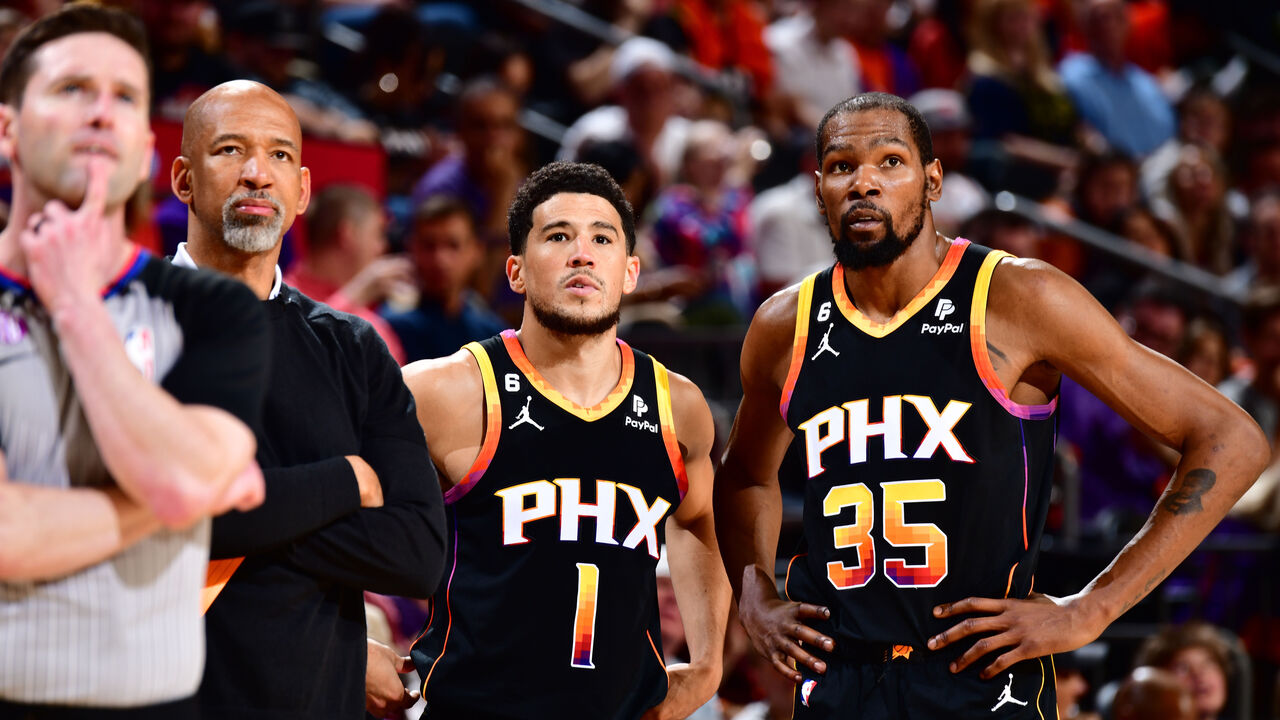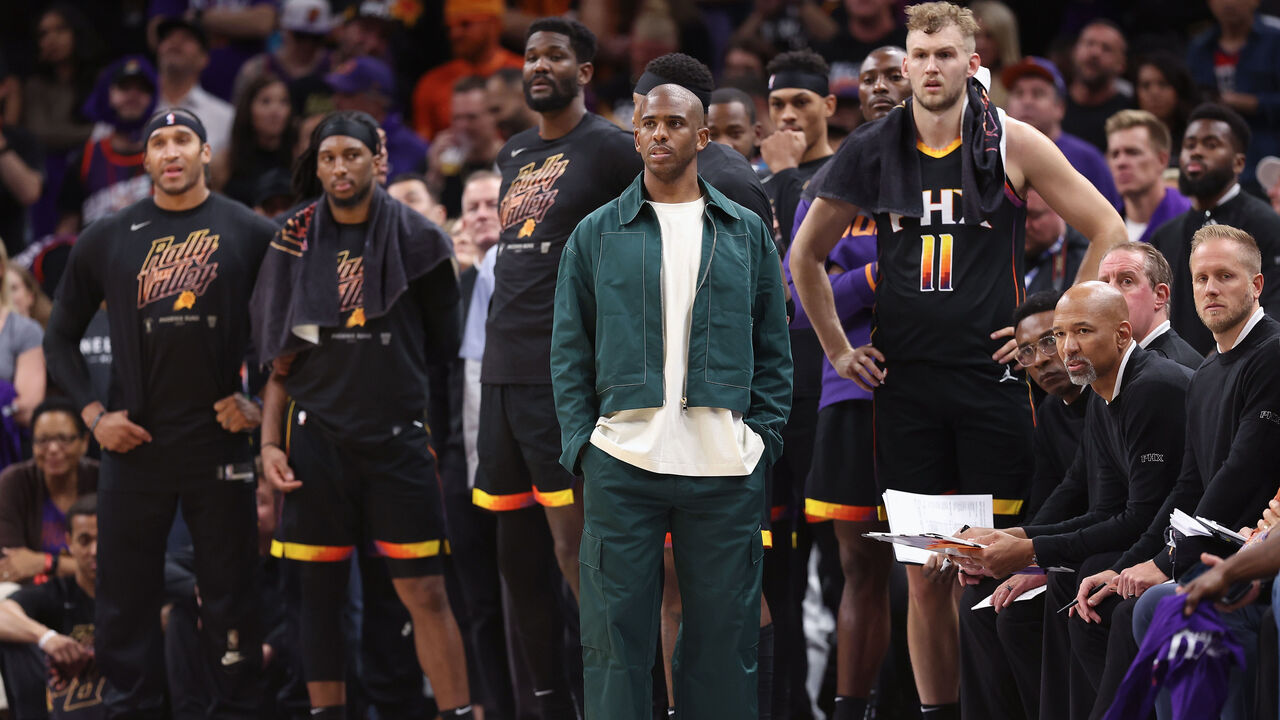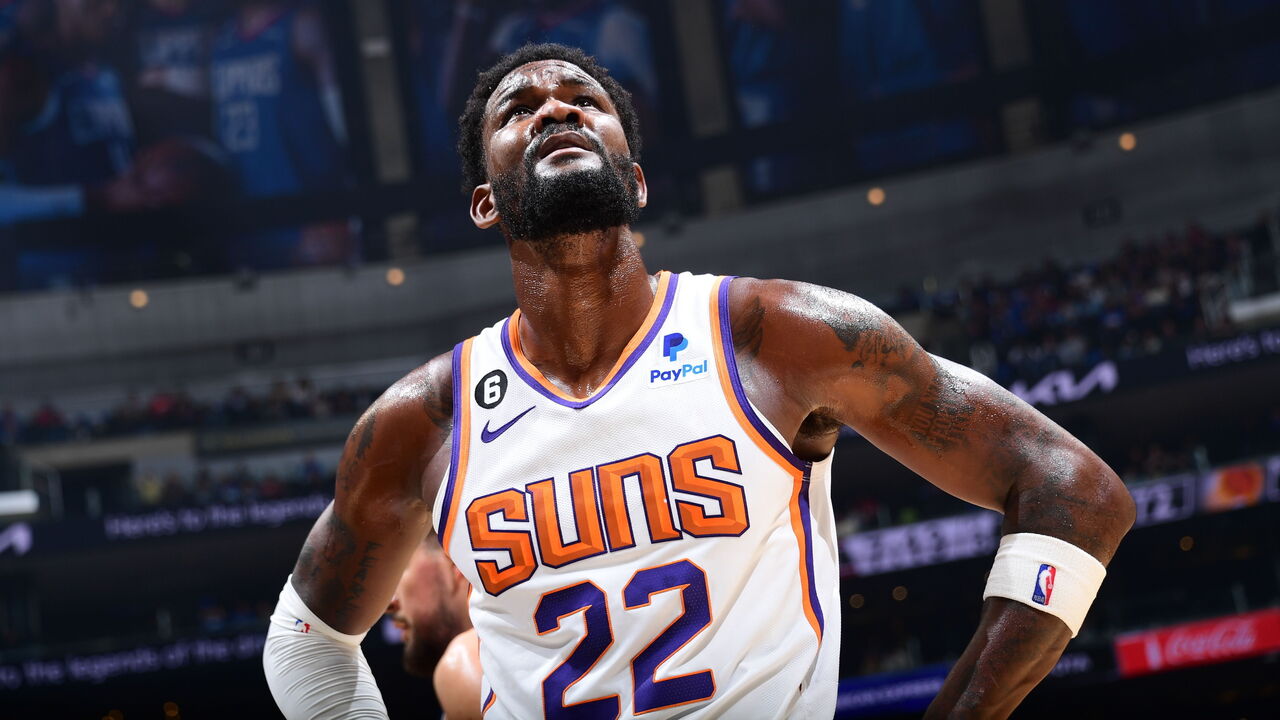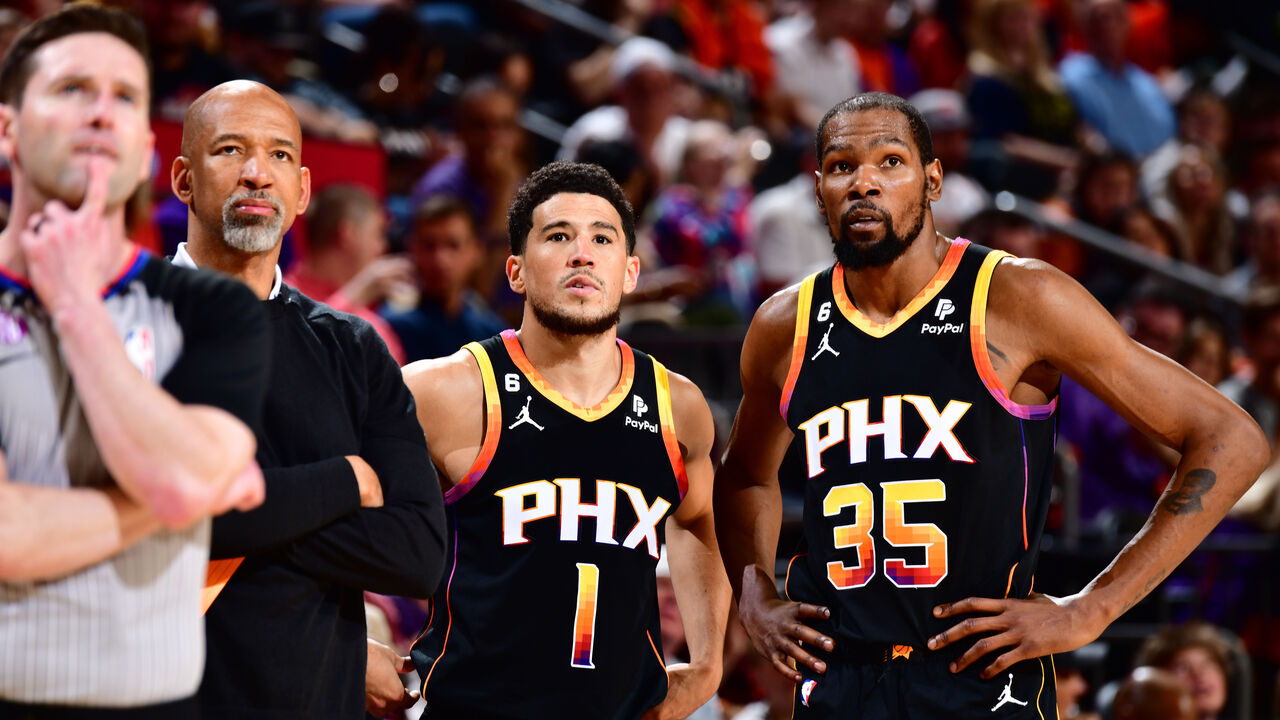Even with Booker and KD, the Suns have more questions than answers
When the Phoenix Suns followed up a trip to the 2021 NBA Finals with a humiliating, second-round, Game 7 defeat as the No. 1 overall seed in 2022, everyone knew a shake-up was needed. Sensing that perhaps Phoenix’s championship window was closing and the team was growing stale, president and general manager James Jones went all-in ahead of the 2023 trade deadline, mortgaging the future – albeit one with a clear ceiling – to acquire Kevin Durant.
The result? Rather than losing a home elimination game by 33 points, as they did last year, the Suns lost their final home game of this season by 25 points, bowing out of the 2023 playoffs with a 125-100 loss to the Nuggets in Game 6 of the Western Conference semifinals. Phoenix was behind by as many as 32 in the second quarter, trailed by 30 at halftime, and never got closer than 20 in the second half.
To be fair, a Suns team already dealing with depth issues went into Game 6 against the top-seeded Nuggets without Chris Paul (who was missing his fourth straight game due to a groin injury) and starting center Deandre Ayton (out with a rib contusion), so there’s no shame in losing the game or series. But the manner in which the Suns ultimately folded was shameful.
Injuries and quality of competition aside, you don’t trade Mikal Bridges, Cam Johnson, and control of up to five unprotected first-round draft picks for Kevin Durant just to end up completely hopeless in a home elimination game with both of Durant and Devin Booker in the lineup. There’s no sugarcoating that.
Durant and Booker were fantastic during Phoenix’s abbreviated playoff run, but in a game where they represented the team’s only chance of surviving to see another day, the two combined for a measly 35 points on 37 shooting possessions.
You can give Booker and Durant the benefit of the doubt given that this series would’ve ended much earlier if not for their heroics. Durant struggled to find his 3-point range this spring, but the 13-time All-Star still averaged 30.8 points, 10.6 rebounds, five assists, and 1.8 blocks over the first five games of the second round. Meanwhile, Booker put together a nine-game stretch for the ages to open the playoffs. It’s quite possible fatigue simply caught up to the star guard given the burden he was shouldering just to drag Phoenix to the finish line every other night.
But the star duo still has to face the music.
Booker is now 0-3 when facing elimination, and he’s the centerpiece of a franchise that has bowed out in listless fashion two years in a row – and that’s after blowing a 2-0 series lead in the NBA Finals. Carrying a team deep into the spring year after year, as Booker has done, is admirable. But at some point, the league’s true game-changers ensure their teams can at least hold their heads high when they walk off the court in defeat.
Meanwhile, Durant has authored some of the greatest individual postseason performances of his generation, but the two-time Finals MVP has lost nine of his last 15 playoff games despite having one of Booker or Kyrie Irving by his side for all of them. Say what you will about how Paul’s latest postseason injury – and Ayton’s ailment – contributed to that, but it’s possible that record would’ve looked even uglier had Clippers superstar Kawhi Leonard not been sidelined for the final three games of Phoenix’s first-round series.

The good news is that when the Suns traded for Durant with three-and-a-half years remaining on his contract, Phoenix ensured it would get more than one kick at the can with KD and Booker together. The bad news is that the Suns have far more holes to fill than you’d expect from a team boasting multiple superstars.
Between Paul’s inability to make it through a postseason in one piece and Durant’s regular-season injury history since returning from a devastating Achilles rupture, the risk of an injury derailing Phoenix’s championship hopes always loomed large. But even at full strength, the team lacked a bona fide fifth starter and quality depth.
With Paul out and Ayton struggling throughout the series against Denver, the Suns found themselves playing crunch-time minutes with Landry Shamet and Jock Landale at one point. With all due respect to Shamet, whose shooting helped buoy the Suns in Game 4, and Landale, a tough big man who made a name for himself this season, that’s not the mark of a team serious about competing for a championship.
The Suns need to make decisions on their own free agents (Landale, Torrey Craig, Josh Okogie, and T.J. Warren, among others) and need to add multiple rotation players while already capped out. The Suns are set to enter the offseason over the luxury-tax threshold and only have about $14 million in wiggle room to avoid the new second-tax apron. That wrinkle in the league’s new CBA could seriously hamper the team-building efforts of big-money squads like Phoenix.
The Suns also don’t own any tradeable first-round picks, given the Brinks truck of draft capital dispatched to Brooklyn in the Durant deal.
If Phoenix is going to make significant changes this summer, the transactions will almost certainly have to include at least one of Paul or Ayton, and the vultures are already circling.

Paul still has his moments of brilliance, knows how to organize an offense, and remains one of the league’s highest-IQ players. But the cracks are starting to show in the 38-year-old’s game, even in the areas where CP3 seemed indestructible. Between the 2007-08 season and 2021-22, Paul finished between the 85th percentile and 100th percentile as a midrange shooter among guards, according to Cleaning The Glass. This season, he was in the 78th percentile. He’s also lost a step on the defensive end, though he can still make up for it with his smarts.
Of the nearly $61 million remaining on Paul’s contract over the next two seasons, only $15.8 million is guaranteed next season, with the final year of the deal fully non-guaranteed. From a trade perspective, Paul can be seen as a large expiring contract next season, but without draft compensation to attach to the deal, can the Suns really expect to get surplus on-court value in a trade?
Of course, if Phoenix runs it back with Paul alongside Booker and Durant, they’d have to contend with the likelihood the team’s Big Three wouldn’t make it through the season intact. Durant has missed 99 regular-season games in the three years since returning from his Achilles injury, while Paul has suffered postseason hamstring, hand, shoulder, and groin injuries in 2015, 2016, 2018, 2021, and now 2023.
Then there’s Ayton, the enigmatic big man who signed an offer sheet with Indiana last summer before the Suns matched the offer to retain him. Ayton’s ability to veto any trades expires in July, and the Suns would be wise to take advantage of that. The question is, how much value do rival teams see in Ayton with three years and approximately $102 million remaining on his contract?
As an efficient, 24-year-old center, teams surely see promise in the 2018 No. 1 pick, but they’ve also seen what’s unfolded in Phoenix. Ayton’s an inconsistent presence on both ends of the court, and he doesn’t protect the rim well enough or space the floor, which doesn’t make him the best fit for the modern game. He’s also yet to record more assists than turnovers over a season.
Whether due to his unwillingness or inability, Ayton’s reluctance to consistently punish mismatches inside often hampered the Suns’ jumper-happy offense. With Durant, Booker, and Paul leading the charge, the Suns were uniquely equipped to beat opponents from the midrange, but the team’s inability to get to the rim combined with a poor 3-point attempt rate put them at a mathematical disadvantage. Ayton’s maddening inconsistency in the paint only exacerbated the problem. In what might’ve been his last playoff series with the Suns, he averaged 10.8 points, 8.2 rebounds, and 1.2 assists in 29 minutes.
Five years after Phoenix selected him first overall with Luka Doncic still on the board, Ayton was losing playoff minutes to Landale – a journeyman. The Suns wouldn’t exactly be selling high.

Booker and Durant give Phoenix an inside track to contention, but the Suns have far more questions than they do paths to solutions.
However the Suns go about reshaping the roster, the hope is that they’ll be right back in the middle of a deep playoff run a year from now, only next time at full strength, with a deeper supporting cast, and with a more balanced shot profile.
At some point, though, it will be up to Booker and Durant to ensure the Suns don’t embarrass themselves again. The buck stops with Phoenix’s superstars.
Joseph Casciaro is theScore’s senior content producer.


